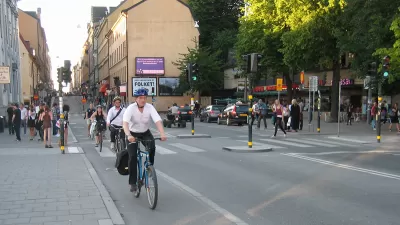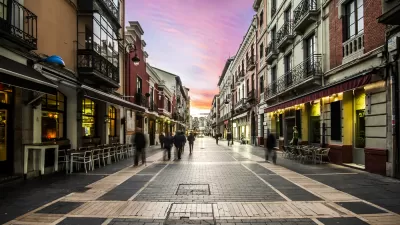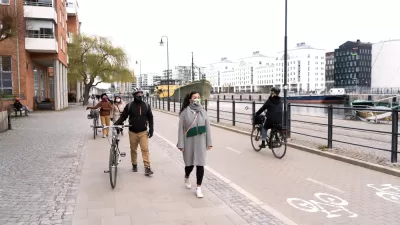Rather than trying to meet all of a community's needs within a one-minute radius, Sweden's Street Moves pilot program gives residents the power to decide how street space gets used.

Move over, "15-minute city," writes Feargus O'Sullivan for Bloomberg. Sweden is pioneering the "one-minute city," a hyper-local vision inspired by the push for decentralizing urban services and creating dense, walkable communities where residents can find almost everything they need within minutes.
Locally-focused schemes such as the 15-minute city and Barcelona's famous superblocks gained steam in 2020 as shelter-in-place orders made people hyper-aware of their immediate neighborhoods and emphasized the need for locally available services and local infrastructure that improves quality of life. Sweden's approach focuses even more closely on "the space outside your front door — and that of your neighbors adjacent and opposite," according to Dan Hill, director of strategic design for Vinnova, Sweden's national innovation agency.
The project, dubbed Street Moves, is being piloted in four sites around Stockholm, where residents can decide how street space is used and allocated through community workshops and consultations. The goal isn't to make everything available within one minute, but rather to reimagine the patches of street immediately outside the home as "critical connecting spaces for communities" and not just "places to move and store cars." If successful, Sweden plans to implement the program on every street in the country by 2030.
FULL STORY: Make Way for the ‘One-Minute City’

Maui's Vacation Rental Debate Turns Ugly
Verbal attacks, misinformation campaigns and fistfights plague a high-stakes debate to convert thousands of vacation rentals into long-term housing.

Planetizen Federal Action Tracker
A weekly monitor of how Trump’s orders and actions are impacting planners and planning in America.

In Urban Planning, AI Prompting Could be the New Design Thinking
Creativity has long been key to great urban design. What if we see AI as our new creative partner?

King County Supportive Housing Program Offers Hope for Unhoused Residents
The county is taking a ‘Housing First’ approach that prioritizes getting people into housing, then offering wraparound supportive services.

Researchers Use AI to Get Clearer Picture of US Housing
Analysts are using artificial intelligence to supercharge their research by allowing them to comb through data faster. Though these AI tools can be error prone, they save time and housing researchers are optimistic about the future.

Making Shared Micromobility More Inclusive
Cities and shared mobility system operators can do more to include people with disabilities in planning and operations, per a new report.
Urban Design for Planners 1: Software Tools
This six-course series explores essential urban design concepts using open source software and equips planners with the tools they need to participate fully in the urban design process.
Planning for Universal Design
Learn the tools for implementing Universal Design in planning regulations.
planning NEXT
Appalachian Highlands Housing Partners
Mpact (founded as Rail~Volution)
City of Camden Redevelopment Agency
City of Astoria
City of Portland
City of Laramie





























